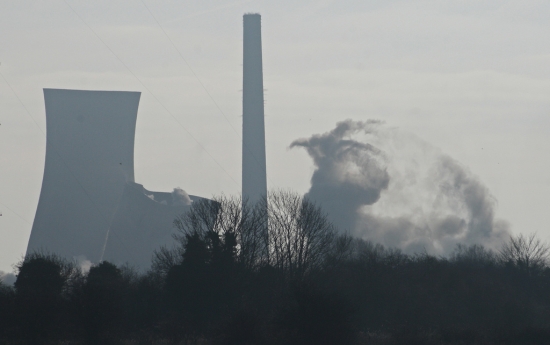Energy regulator Ofgem has this week warned business owners that power shortages across the UK could lead to widespread blackouts in the coming years. These shortages, it claims, will be caused by a number of factors, not least of which is the closures of several ageing power stations which are unlikely to be replaced by alternatives for some time yet.

Richborough Power Station demolition March 11 2012
Most of the power plants facing closure are coal powered and thus do not meet environmental targets set by the Government to reduce the UK’s carbon footprint. However, thanks to the high wholesale price of gas, Ofgem has warned that relying solely on gas-powered energy producers could prove to be very costly for the UK taxpayer.
In a bid to preserve energy, owner of the electricity network National Grid proposed a scheme whereby large-scale power users such as factories and warehouses reduce their usage between the hours of 4pm and 8pm on winter weekdays – the season in which consumption is highest. However, this plan was dismissed by the government, with Energy Minister Michael Fallon insisting that Ofgem would find a suitable solution.
He said; “I can assure you the lights are not going to go out.
“The latest Ofgem assessment has shown that the position is slightly worse than the previous assessment last year.
“The regulator Ofgem has got to make sure, with all the tools at its disposal – bringing some mothball plant back into action and back online – that the lights stay on and they will.”
In the latest assessment, Ofgem found that the UK’s spare electricity production capacity could fall to only 2 per cent by 2015; meaning the risk of blackout is significantly higher than it was thought to be only a few months ago. This could have a big impact on businesses, especially those which rely on power at all times in order to meet production targets – the London Stock Exchange being only one example, for instance.
National Grid is now working with the Department of Energy and Climate Change to examine the implications of suggestions made in the Ofgem report. Some of these suggestions, such as keeping reserve power stations in an operational state and financially compensating major energy users for taking power-saving measures, are currently on the table.
In a statement, National Grid said that it welcomed Ofgem’s involvement in the issue. It added; “This does not mean that disruption is imminent or likely, but Ofgem, DECC and ourselves believe it appropriate to consider what measures could be taken in case margins deteriorate further.”
Previous Post
Chinese Investors Target US Market